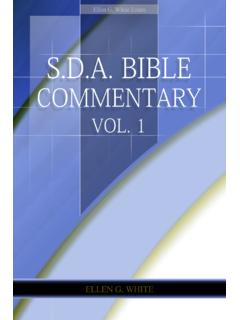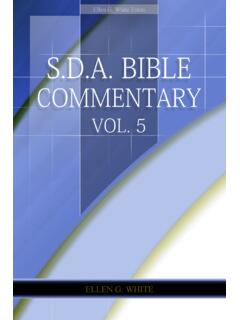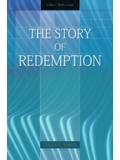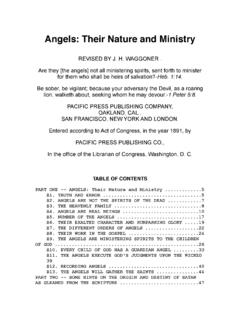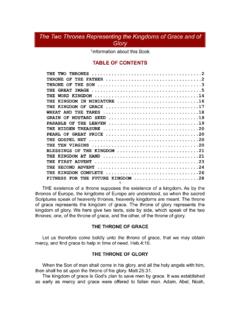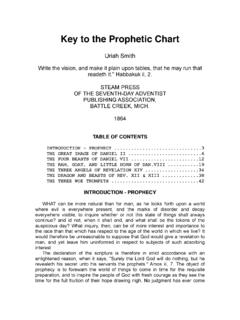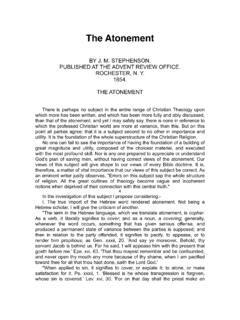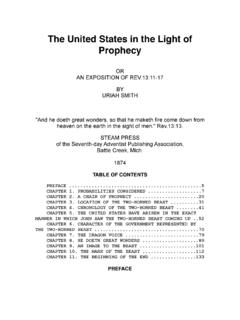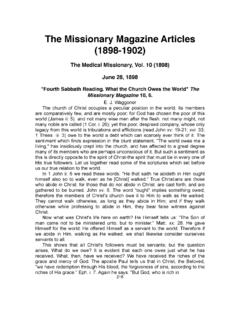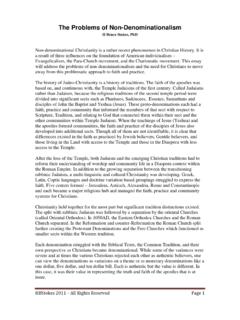Transcription of Urge Separation of Church and State - …
1 Urge Separation of Church and StateA. T. JonesFrom Washington, (D. C.) 'Herald' April 19 [18 sic.], 1912. Absolute divorcement of Church and State was the theme of speeches made at a hearing before Secretary of the Interior Fisher yesterday by Alonzo T. Jones and other prominent men against President Taft's revocation of the order of Indian Commissioner Valentine that no representative of any religious denomination should wear religious insignia or garb in the Indian schools maintained by the government. Same Old Question."Mr. Secretary: The original and fundamental question of which the question before you to-day is but an incident," said Mr.
2 Jones, "is the national and fundamental question of the Separation of Church and State in this nation. The letter of the President on the subject recognizes this. "This incidental question to-day is the same old one that is always involved in the union of Church and State : that is, that the people who urge it, not only insist on being recognized by the State as supremely religious, but that the State shall pay them for their exercise of their own religion. "Twenty-seven years ago the original situation, of which this to-day is but an incident, was that the churches owned these Indian schools.
3 They were openly and in every respect Church schools; of 2course with priests and nuns in charge in the Catholic schools. There was no suggestion that they were anything but 'schools of particular religious denominations.' And the government intentionally and openly paid to the denominations as such hundreds of thousands of dollars for conducting those, their own Church schools. "There was wrought a change; the Protestant churches refused any further government appropriations. But the government 'took over the Catholic Indian schools.
4 ' This also is recognized in the President's letter on this subject. Precisely Church Schools."The present situation, therefore, is that professedly these Catholic Church schools are government schools; though they are precisely the same Catholic Church schools that they were before, with their priests, nuns, and all; and all in their Church and religious garb. "The original situation was so manifestly a union of Church and State that it could not decently be maintained any longer; and the administration in 1889 decided 'to divorce the government absolutely' from this acknowledged union with the Church .
5 That purpose has been steadily pursued ever since, but has not yet been accomplished, for it is still the same union of Church and State that it was then. Indeed, the union is closer now than it was then. This present issue of the effort to accomplish absolutely that intended and perfectly proper divorcement. "Twenty-two years ago next July 24, from his place in the Senate, Senator 3 Dawes, as chairman of the Committee on Appropriations, said that the original situation of which this to-day is an incident the original of this union of Church and State was created by the Catholic Bureau of Missions in this city, which, he said, had then 'been on the ground here for the last five years, pushing Catholic schools upon the government.
6 ' Exercises "Pushing Energy.""The pushing of Catholic schools upon the government was nothing less than the pushing of the Catholic Church upon the government. That same Catholic Bureau of Missions is still here, and is of record in this case as exercising that same 'pushing' energy. And that is the cause of this situation to-day. And when they are so tenacious that their garb shall be retained in the government schools, it is perfectly certain that they will be no less tenacious as to the actual teaching of their doctrines there. "Senator Dawes further said that day that the then 'present management was in favor of divorcing the government absolutely from them all [all churches], but it found it impossible to do that.
7 ' "Commissioner Valentine's order in this case was and is a laudable, constitutional endeavor, in accordance with acts of Congress, to complete the good work that twenty-three years ago was begun of divorcing the government absolutely from the Catholic Church . Is it still to be confessed that it is 'impossible to do that?' Is the present administration ready and willing to confess that it is 'impossible to do that?' "That, Mr. Secretary, is the question now before the administration of which you are a part; and not only before this 4administration, but before this whole nation; and it is of vital interest to the whole world.
8 " ADDENDAC ommissioner Valentine issued an order that "in accordance with that essential principle of our national life, the Separation of Church and State " no representative of any religious denomination should at general assembly exercises or in public school rooms wear any religious garb or insignia. In the President's letter revoking that order he said: "I fully believe in the principle of the Separation of Church and State on which our government is based; but the questions presented by this order are of great importance and delicacy.
9 They arise out of the fact that the government has for a considerable period taken over for the use of the Indians certain schools theretofore belonging to and conducted by distinctive religious societies or churches. As a part of the arrangements then made the school employees who were in certain cases members of religious orders wearing the distinctive garb of these orders, were continued as teachers by the government, and by ruling of the Civil Service Commission or by executive action they have been included in the classified service under the protection of the civil service law.
10 " The dispatch from Rome reporting Major Butt's special trip to the Pope, says that he "presented a letter from Presideut [sic.] Taft thanking the Pontiff for the creation of three new American cardinals. The President wrote that this action was acceptable to Americans irrespective of their faith, as Catholicism contributes to the welfare of the country." Is that "action" acceptable to you? You are pledged to the Pope by President Taft telling him of his mistake. Will you do this? Or will you allow yourself and your country thus to be delivered bodily to the Papacy, and you not say a word nor let anybody know even whether you are alive?
